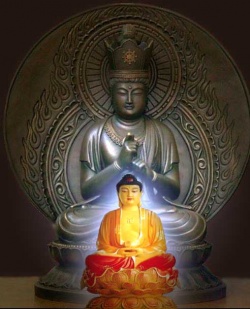Latter Day of the Law
Latter Day of the Law
末法 (Jpn mappo )
Also, age of the Decadent Law, age of the Final Law, or latter age.
The last of the three periods— the Former Day of the Law, the Middle Day of the Law, and the Latter Day of the Law—following Shakyamuni Buddha's death, when his teachings are said to fall into confusion and lose the power to lead people to enlightenment.
The Latter Day of the Law is said to last for ten thousand years.
The fifth of five five-hundred-year periods following Shakyamuni's death described in the Great Collection Sutra corresponds to the beginning of the Latter Day of the Law.
The sutra predicts that it will be an "age of quarrels and disputes," when monks will disregard the precepts and feud constantly among themselves, when erroneous views will prevail, and when Shakyamuni's teachings will "be obscured and lost."
In contrast, the Lotus Sutra views the Latter Day of the Law as the time when the teaching it contains will be propagated.
The "Medicine King" (twenty-third) chapter of the Lotus Sutra says, "After I have passed into extinction, in the last five-hundred-year period you must spread it abroad widely throughout Jambudvipa and never allow it to be cut off."
T'ient'ai (538-597) states in The Words and Phrases of the Lotus Sutra,
"In the last five-hundred-year period, the mystic way will spread and benefit humankind far into the future," and Dengyo (767-822) says in An Essay on the Protection of the Nation, "The Former and Middle Days are almost over, and the Latter Day is near at hand."
It was believed in Japan that the Latter Day would begin in 1052; this was based on an account in The Record of Wonders in the Book of Chou that places Shakyamuni's death in 949 B.C.E. Modern research suggests, however, that he died in the early fifth century B.C.E.
The concept of the Latter Day of the Law is also applied to Buddhas other than Shakyamuni, and Buddhist scriptures often refer to the "Latter Day of the Law" of a particular Buddha as the age in which that Buddha's teachings are lost. See also fifth five-hundred-year period.
